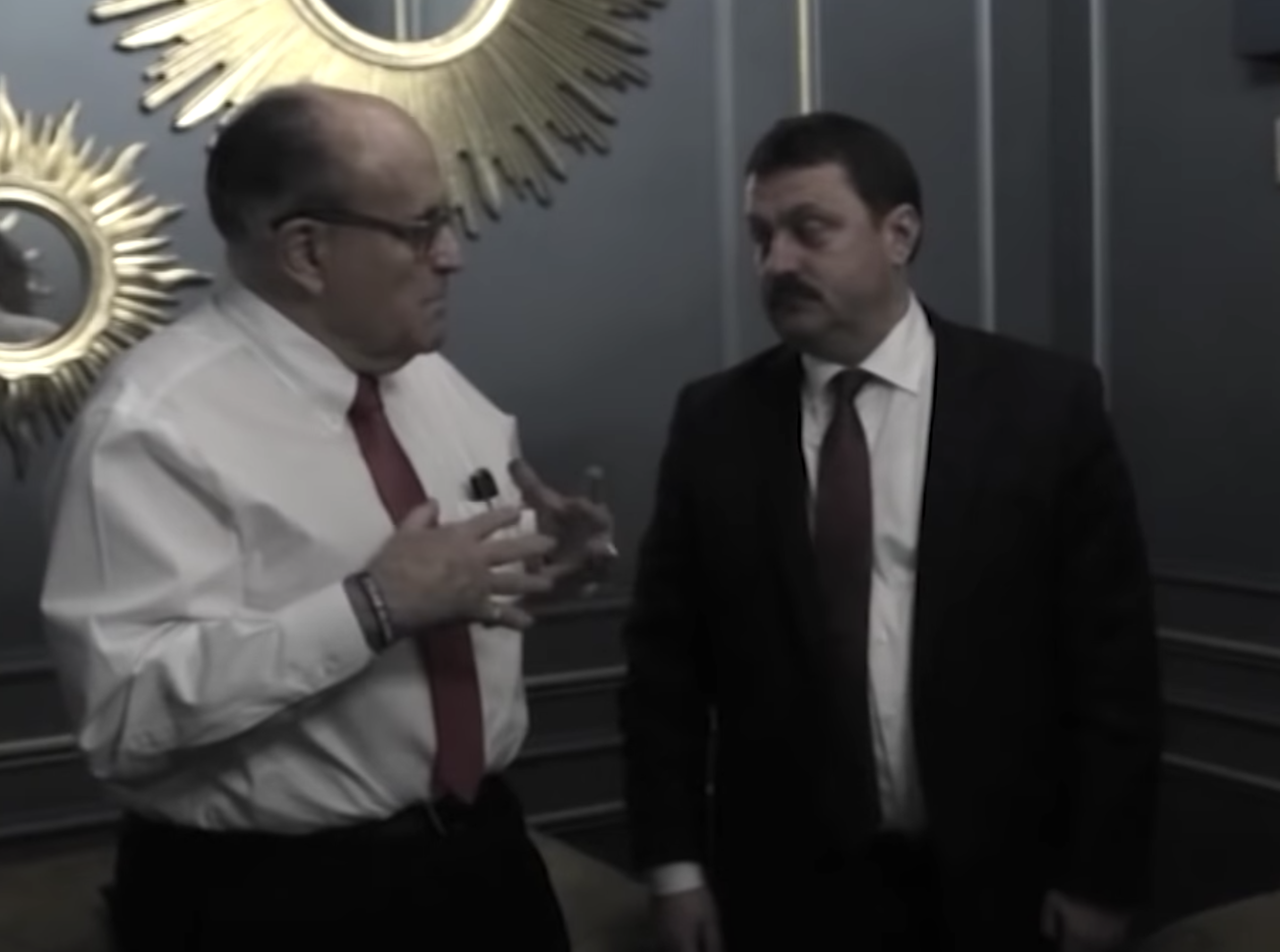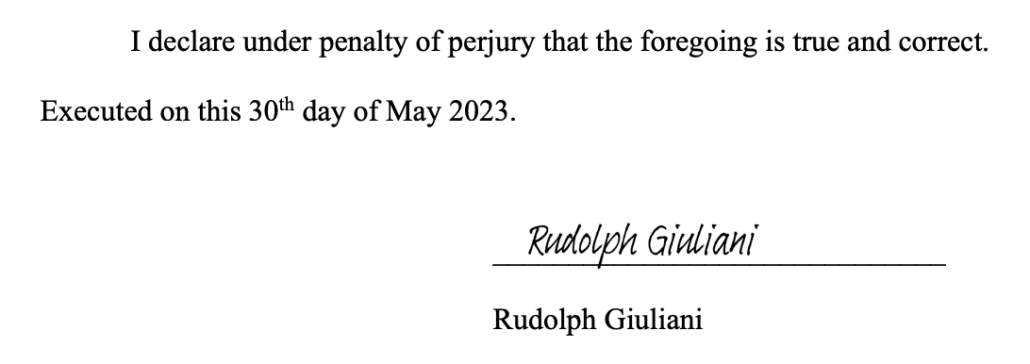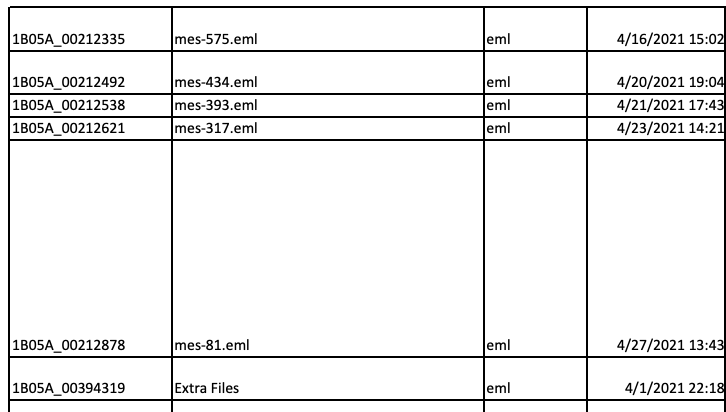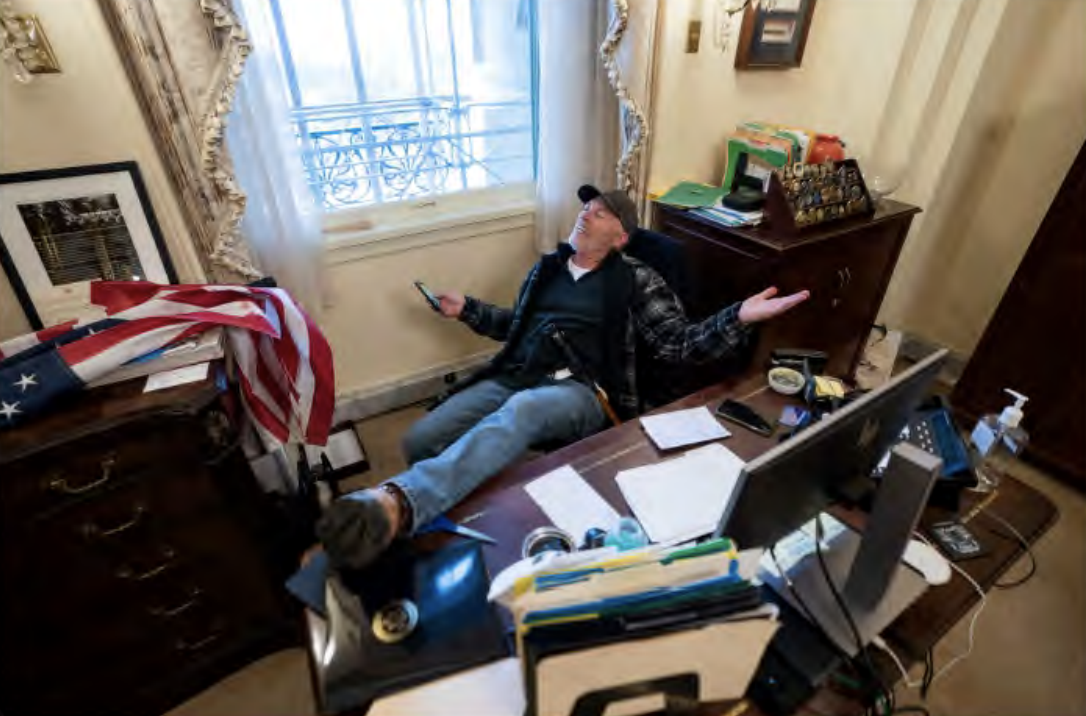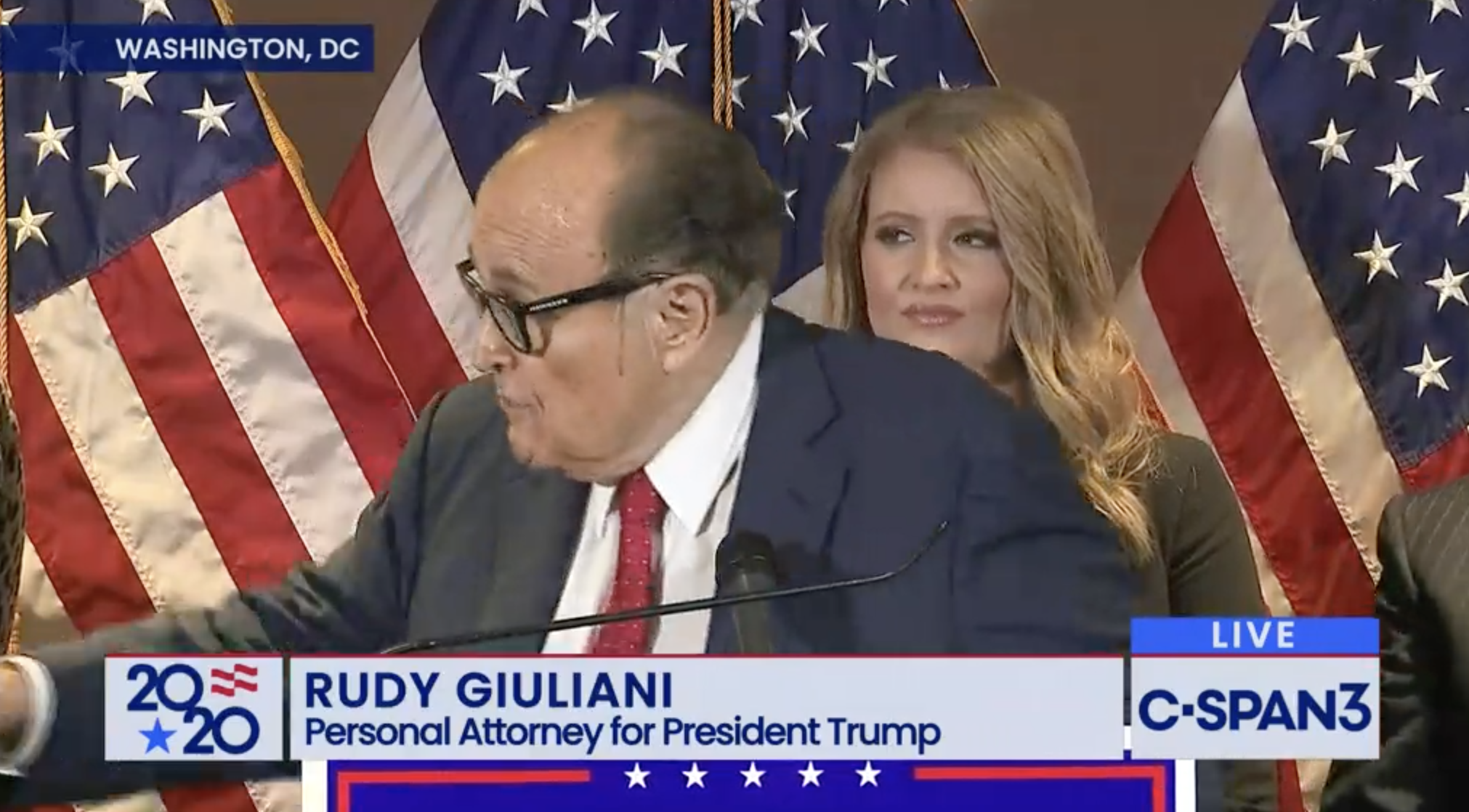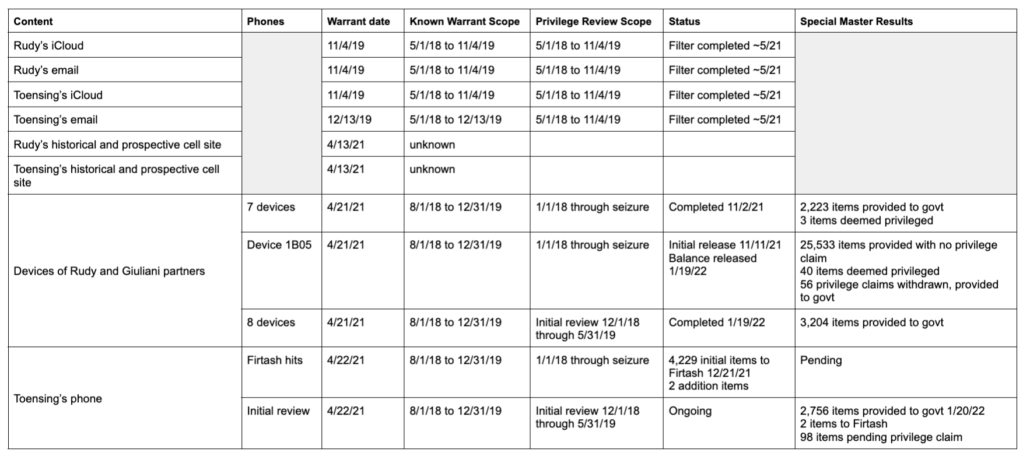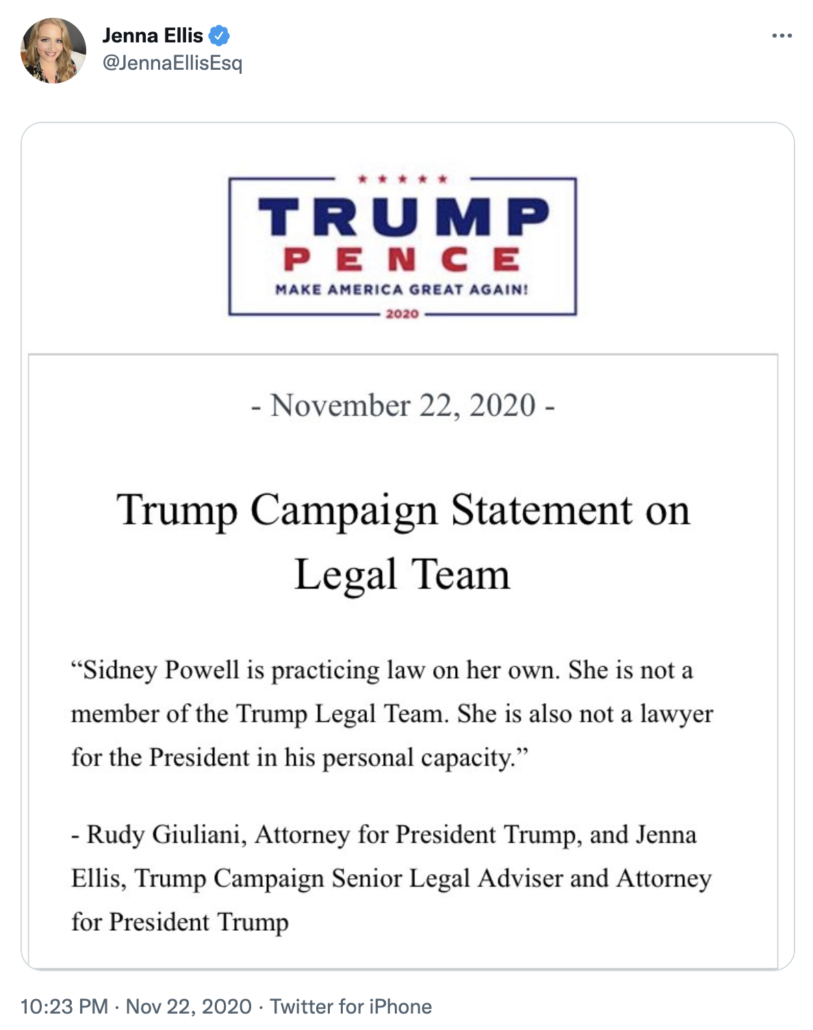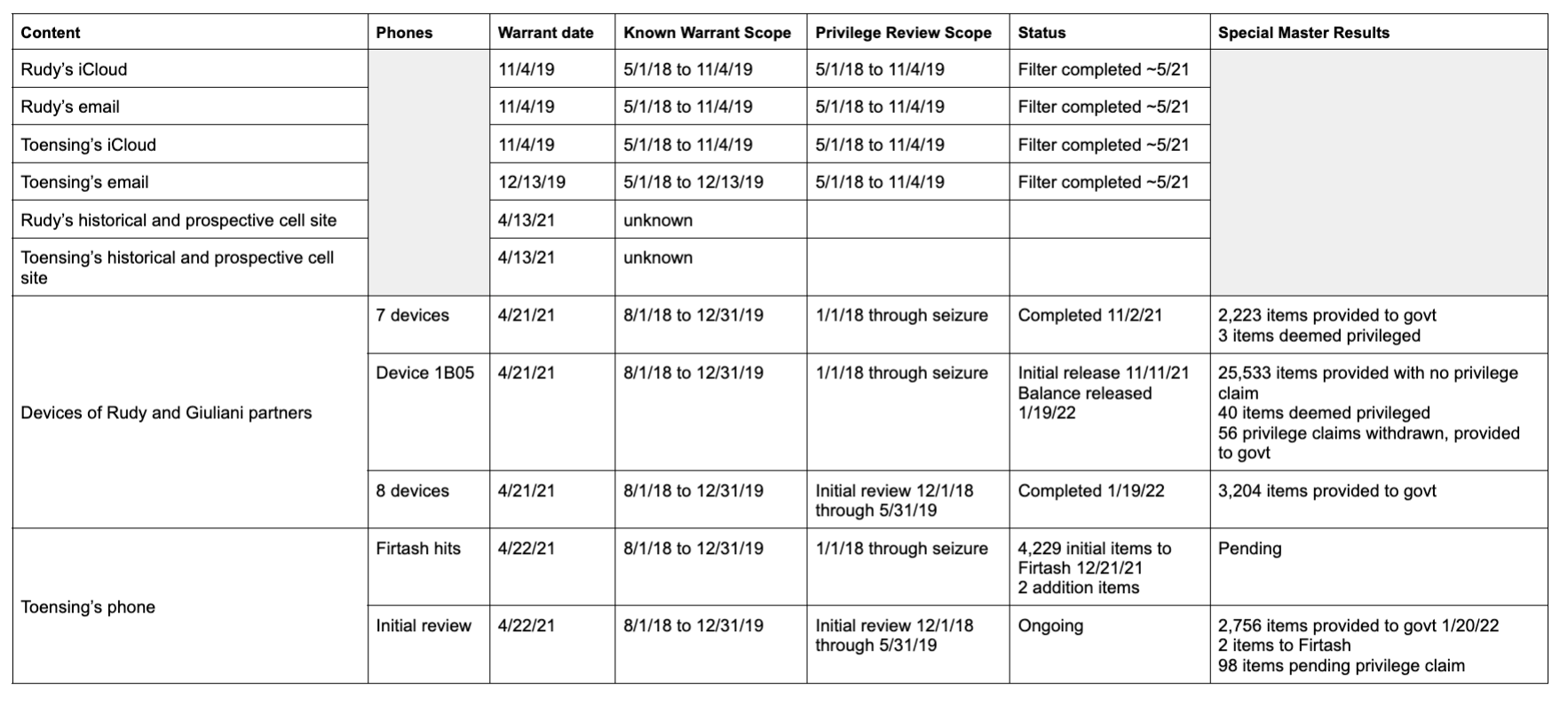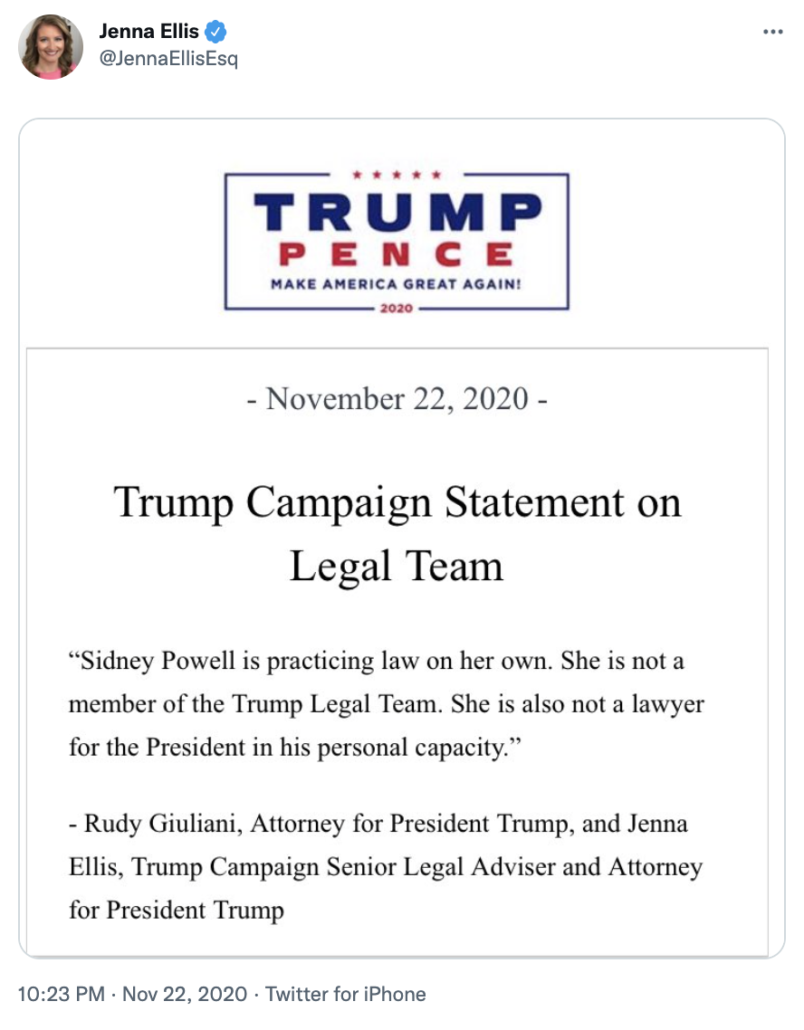In Rudy Giuliani Affidavit, SDNY Hung Up the Perfect Phone Call
Consider this: The April 21, 2021 warrant affidavit showing probable cause for the search of Rudy Giuliani’s home, office, and devices did not mention the Perfect Phone Call between Donald Trump and Volodymyr Zelenskyy.
It could have done so. Earlier warrant affidavits targeting Lev Parnas and Igor Fruman, starting with a bunch obtained on October 21, 2019, included it.
On July 25, 2019, President Trump spoke to Ukrainian President [Zelenskyy]. According to a memorandum of the call, which the White House released publicly, President Trump noted that “[t]he former ambassador from the United States, the woman, was bad news and the people she was dealing with in the Ukraine were bad news.” He also praised a “very good prosecutor,” which appears to be a reference to [Lutsenko,] who was still in place at that time following [Zelenskyy’s] election but subsequently removed from office, or possibly [Shokin,] the former prosecutor.
While SDNY did not release the affidavit for a December 10, 2019 warrant focused exclusively on the Foreign Agent charges, this same reference did appear in an affidavit to obtain the contents of Lev Parnas’ Instagram account the same day.
In context of the potential FARA charges tied exclusively to the firing of Marie Yovanovitch, the paragraph showed that Trump had been persuaded by Rudy Giuliani’s lobbying not just that Yovanovitch “was bad news,” but that the prosecutors behind the effort to oust her, Yuriy Lutsenko and/or Viktor Shokin, were “very good.”
Moreover, the paragraph is particularly relevant evidence in the affidavit targeting Rudy. Far more specifically than the (much earlier) affidavits targeting Lev Parnas, the Rudy affidavit describes that Rudy lobbied Trump to fire Yovanovitch at least three times (the affidavit clearly identifies two instances: once on February 16, 2019, and again on March 22) and lobbied Mike Pompeo at least twice (once on February 8 and again when the White House forwarded his packet of disinformation in March) before he and Parnas turned to a press campaign involving John Solomon to get her ousted.
Yet the only public affidavit targeting Rudy, unlike several targeting Lev Parnas, excluded the paragraph showing the extent of Rudy’s influence.
There may be a perfectly banal explanation, such as an attempt, relatively early in Merrick Garland’s tenure, to minimize the extent to which this was about Trump personally. Or, the Perfect Phone Call might embody some of the uncertainty, noted explicitly in the affidavit, about whether Rudy was targeting Yovanovitch to get contracts with Lutsenko, or whether he was doing it only to get disinformation, to benefit Trump, on Hunter Biden. Given the high likelihood that data seized in this search was also used in other, undisclosed investigations into Rudy — DOJ may not yet have had a January 6 warrant targeting Rudy, but in June 2021, DOJ took overt steps in the investigation into an anti-Hunter Biden film that Rudy plotted — the silence about the Perfect Phone Call may simply reflect the boundary line between investigative prongs. That is, maybe the Perfect Phone Call appears in another affidavit.
The anti-Hunter film was, reportedly, an investigation into possible foreign support. As this table, which compares the scope of investigation in three warrants for substantially the same Foreign Agent investigation, shows, the funding of Rudy’s shenanigans shifted focus over the course of the investigation.
The warrants include:
- October 21, 2019, 19 MJ 9832, obtained days after Parnas’ arrest, as SDNY obtained warrants to expand the scope of the investigation to incorporate its expanding Foreign Agent focus
- December 10, 2019, 19 MJ 11500, obtained days after Rudy met with Andrii Derkach, which would have been a natural follow-on investigation to the Parnas investigation, but which Barr moved to EDNY to protect Rudy’s ability to solicit dirt from Russian agents to help Trump’s 2020 campaign
- April 21, 2021, 21 MJ 4335, obtained on Lisa Monaco’s first day as Deputy Attorney General, when SDNY finally obtained approval for warrants targeting Rudy’s home and devices
In October 2019, DOJ wasn’t looking closely at how the Ukraine caper was funded. In December 2019, it made up two bullets of the warrants, permitting the seizure of:
- Evidence of any funds sent into any account controlled by or associated with [redacted] or Giuliani, or any instructions to send such funds. (c)
- Evidence of money, actions, or information requested by, or offered or provided to Parnas, Fruman, Giuliani, or [Toensing] by any Ukrainian national in connection with efforts to remove [Yovanovitch], including but not limited to any Ukrainian investigation of [Burisma Holdings] Ltd., [Hunter Biden], or potential interference in the 2016 U.S. presidential election. (e)
That December 2019 focus on funding may have reflected details about Lev Parnas that SDNY had only just discovered. In an unsuccessful bid to have Parnas detained pretrial submitted the day after DOJ obtained that December 10 warrant targeting Lev Parnas, SDNY laid out what it had learned about the funding of the Ukraine caper.
Parnas poses a significant risk of flight for several reasons, the chief among which are his considerable ties abroad and access to seemingly limitless sources of foreign funding. Parnas has extensive and significant international ties, particularly in Ukraine, the country of his birth. Over the past two years, Parnas traveled repeatedly to Ukraine, and met with numerous Ukrainian government officials, including officials at the very highest level of government. More broadly, Parnas has traveled abroad more than twenty times over the past four years, including on a nearly monthly basis in 2019. Parnas took circuitous travel routes that obscured his final destination, such as by departing the U.S. for one country, but returning from a different country on a different airline. Parnas traveled internationally by private jet as recently as this year; bank account records from Account-1 show that Parnas spent more than $70,000 on private air travel in September 2019 alone.
[snip]
In addition, Parnas’s close ties abroad include connections to Russian and Ukrainian nationals of nearly limitless means, including [Andrey Muraviev] and a Ukrainian oligarch [Dmitry Firtash] living in Vienna who is currently fighting extradition to this country. Parnas has proven adept at gaining access to foreign funding: in the last three years, Parnas received in excess of $1.5 million from Ukrainian and Russian sources. In sum, given Parnas’s significant, high-level connections to powerful and wealthy Ukrainians and at least one Russian national, he could quickly and easily flee the United States for Ukraine or another foreign country, and recoup the security posted to his bond. It is difficult to overstate the extreme flight risk that Parnas poses.
[snip]
- Between August and October 2019, Parnas received $200,000—not $50,000, as he told Pretrial Services—from the Law Firm into Account-1, which was held in Svetlana Parnas’s name, in what appears to be an attempt to ensure that any assets were held in Svetlana’s, rather than Lev’s, name.5 A portion of this money existed in Account-1 at the time that Parnas submitted his financial affidavit, and, to the Government’s knowledge, does so today, underscoring that Parnas continues to mislead the Government and the Court about his financial condition.
- Parnas failed to disclose, in describing his income to the Government and Pretrial Services, the fact that in September 2019, he received $1 million from a bank account in Russia into Account-1. While the majority of that money appears to have been used on personal expenses and to purchase a home, as discussed below, some portion of that money existed in Account-1 at the time Parnas submitted his financial affidavit.
- At the time of his arrest, Parnas had at least $200,000 in an escrow account, in connection with his intended purchase of a property located in Boca Raton, Florida, which was listed for sale at approximately $4.5 million. The escrow account was funded with $200,000 from Account-1 in September 2019. Parnas did not disclose this asset (either the property or the funds in the escrow account) to either Pretrial Services or the Government. It is unclear whether Parnas proceeded with this real estate purchase or received the funds back from the escrow account.
In an appearance on Michael Cohen’s podcast last month, Parnas addressed how various Ukrainian, Russian, and American oligarchs were funding his and Rudy’s efforts; he says it’ll also appear in his forthcoming book.
The warrant targeting Rudy 17 months later doesn’t reveal what SDNY had learned about the funding in the interim, nor does it sustain the focus on how this was all funded. It states with some certainty that in spite of two rounds of discussions of retainer agreements with Lutsenko and others, Rudy never got any money from them.
Based on my involvement in this investigation and my review of text messages, it appears that Giuliani was referring to the execution of [redaction] retainer agreement and the wiring of funds. However, based on my review of bank records, it does not appear that [redacted] wired funds to Giuliani at that time, or any subsequent time.
As NYT emphasized in their report on these warrants, the later warrant does describe that Rudy needed the money.
6 Based on my review of a financial analysis prepared based on bank records and public reports, it appears that around this time, Giuliani had a financial interest in receiving a retainer agreement from [redacted] Specifically, in May 2018, Giuliani left his former law firm and its substantial compensation package. Based on my review of a financial analysis of bank records that have been collected to date (which may not include all of Giuliani’s checking and credit card accounts), on or around January 25, 2018, Giuliani had approximately $1.2 million cash on hand, and approximately $40,000 in credit card debt. By contrast, on or around January 25, 2019, right before he met with [redacted] Giuliani had approximately $400,000 cash on hand in those same accounts and approximately $110,000 in credit card debt. By on or around February 16, 2019, his account balances had dropped to approximately $288,000 and his credit card debt remained over $110,000.
Perhaps because of what SDNY claimed were Parnas’ efforts to obscure his travel, the December 2019 warrant (for which, remember, it did not release the affidavit) added a bullet point, seemingly an afterthought unmarked by a letter, authorizing seizure of evidence that the men were hiding meetings with Ukrainians.
Evidence of efforts or attempts to conceal meetings with individuals acting on behalf of or associated with any Ukrainian national or government official. (no letter)
By contrast, the April 2021 affidavit targeting Rudy was interested in one single trip: His February 2019 trip, with Parnas, to Warsaw.
Evidence relating to a trip by Rudolph Giuliani to Poland in February 2019.(5)
As the affidavit describes, there was good reason to believe Rudy’s public claims about the trip — made in the days after the Perfect Phone Call was released — were lies, because immediately after the meeting, Rudy drafted a retainer shortly after the meeting and started lobbying Trump and Pompeo.
7 Based on my review of public reporting, I have learned that according to an article published on September 29, 2019 in Reuters, Giuliani admitted that he met [Lutsenko] in Warsaw in February 2019 after first meeting him in New York in January, but that the meeting with [redacted] in Warsaw was “really social . . . I think it was either dinner or cigars after dinner. Not opportune for substantive discussion.” However, this does not appear to be accurate, as described herein, Giuliani circulated a draft retainer agreement between [2 words redacted] and [redacted] (a firm owned by [Toensing] and her husband, [Joe DiGenova]) only five days after meeting with [redacted] and communicated with Parnas and [redacted] about lobbying [Pompeo] and Trump to remove [Yovanovitch] on the same day, and in the days following, his meeting with [redacted].
The reference to Lutsenko in that Reuters story is minor; far more of the story focuses on who paid for Rudy’s galivanting — again, a topic dropped in the later known warrant.
One of the key questions is who financed Giuliani’s globe-trotting as he pursued unsubstantiated allegations that Biden had tried to fire Ukraine’s then chief prosecutor, Viktor Shokin, to stop him investigating an energy company on which his son Hunter served as a director.
“Nobody pays my expenses,” Giuliani said in an interview with Reuters on Friday. “What does it matter if I’m getting paid for it. Isn’t the real story whether he (Biden) sold out the vice presidency of the United States, not whether I got paid for it?”
The singular focus on that Warsaw meeting — a meeting that took place at an event designed to undermine Obama’s Iran Deal, which Rudy attended in conjunction with MEK (former NJ Senator, Robert Torricelli, with whom John Solomon has a past, also attended with MEK) — is all the more interesting given the temporal scope of the warrant.
The other two warrants I adress here were dictated by dates of collection. Because the October 21 warrant authorized an expanded search of materials obtained months earlier, its temporal scope necessarily ended at the collection date, May 16, 2019. Because the December 10 warrant authorized an expanded search of materials seized from the search of Parnas and Fruman’s residences (primarily Parnas’ — by this point, SDNY seemed to be scrutinizing Parnas far more closely than it did Fruman), its temporal scope necessarily ended on that collection date, October 9, 2019.
But the Rudy warrant extended long past the last overt act, the firing of Yovanovitch, described in the warrant, to December 31, 2019. Here’s how the FBI justified that:
To the extent materials are dated, this warrant is limited to materials created, modified, sent, or received between August 1, 2018, and December 31, 2019. Materials going back to approximately August 2018 are relevant to understand Giuliani’s relationship with Parnas and information he was provided in the fall of 2018 relating to, among other things, Ambassador [Yovanovitch] and Ukraine. Materials created, modified, sent, or received after approximately May 2019, when the Ambassador was removed from her post, through the end of December 2019, during which time Giuliani traveled to Europe to meet [Lutsenko] with are relevant because based on my review of the Prior Search Warrant Returns, it appears that Giuliani continued to make public statements about Ukraine and the Ambassador.
Thus, it rationalized extending the warrant’s temporal scope through December 2019 — a temporal scope that would include the trip for the anti-Hunter Biden documentary, on which Rudy again met Lutsenko, but also met known Russian asset Andrii Derkach and others who would later be deemed Russian assets — based on Rudy’s continued focus, vaguely, on Ukraine (as well as Yovanovitch).
But it’s not clear whether FBI would be able to access details of Rudy’s meeting with Derkach, as opposed to Lutsenko, with this warrant. The long redaction in this bullet point shields who else, in addition to Parnas and Lutsenko, was included in the scope of the known warrant.
In other words, though the temporal scope of the warrant would permit FBI to review information about Rudy’s later meetings with Lutsenko, in association with which trip Rudy also met a series of Russian assets, nothing unredacted in the warrant permitted FBI to seize information about that later meeting (or about the anti-Hunter Biden documentary).
For that matter, nothing unredacted in the April 2021 warrant explicitly permits the FBI to seize information about Rudy’s attempts to dig up disinformation targeting Hunter Biden and his father, even though the warrant affidavit likely mentions such efforts at more than twelve times (one, two, three, four, five, six, seven, eight, nine, ten, eleven, twelve).
Still, as I’ve noted repeatedly, by the time Judge Oetken approved the Special Master process that Rudy himself had demanded, Special Master Barbara Jones was instructed to review all content post-dating January 1, 2018, a temporal scope significantly broader than the one laid out in the warrant. And according to her reports, while for some devices she focused more nearly on the timeframe of the Ukraine caper, those she reviewed first, she reviewed through the date of seizure.
We still know just a fraction of the story about how Bill Barr obstructed the investigation into Rudy Giuliani’s Ukrainian influence peddling — and the degree to which that let Rudy get rid of phones before the investigation would have otherwise developed (for example, the warrant describes that Rudy replaced a phone used with his main phone number on the date the House started subpoenaing records in advance of impeachment). That is, even though SDNY took aggressive investigative steps on Lisa Monaco’s first day as Deputy Attorney General, it was likely already too late.
Update: Back in real time, I posited that the first time Rudy pitched Mike Pompeo on firing Marie Yovanovitch was done while in Trump’s presence.
Timeline
Below, every bullet is a known warrant. The ones not linked were described in a passage that failed to be fully redacted in a Lev Parnas filing.
- January 18, 2019, 19 MJ 1729: Yahoo and Google content
May 15, 2019: Marie Yovanovitch firing public
- May 16, 2019, 19 MJ 4784: iCloud content
- August 14, 2019, 19 MJ 7593: Yahoo and Google content since January, with expanded focus
- August 14, 2019, 19 MJ 7594: Unknown warrant
- August 14, 2019, 19 MJ 7595: Existing Yahoo and Google content, with expanded focus
September 25, 2019: Disclosure of Perfect Phone call
October 9, 2019: Lev Parnas and Igor Fruman arrested
- October 17, 2019, 19 MJ 7595: Actual authorization of the warrant approved in August
- October 21, 2019, 19 MJ 9829: iCloud content since May
- October 21, 2019, 19 MJ 9830: Unknown warrant
- October 21, 2019, 19 MJ 9831: Devices from Dulles
- October 21, 2019, 19 MJ 9832: Existing iCloud content for expanded focus
- November 4, 2019: Warrant for Rudy’s iCloud
- November 4, 2019: Warrant for Rudy’s email
- November 4, 2019: Warrant for Victoria Toensing’s iCloud
- November 6, 2019: Warrant for Yuriy Lutsenko’s email
December 5, 2019: Rudy meets with known Russian asset, Andrii Derkach
- December 10, 2019, 19 MJ 11500: Stuff seized from residences for foreign agent focus
- December 10, 2019, 19 MJ 11501: Instagram
- December 10, 2019, Warrant for Roman Nasirov’s email
- December 13, 2019, Warrant for Victoria Toensing’s email
December 14, 2019: Barr aide texts him: “Laptop on way to you”
January 3, 2020: Barr establishes dedicated channel to ingest Rudy’s dirt
January 17, 2020: Jeffrey Rosen makes Richard Donoghue a gatekeeper for all Ukraine-related investigations
- February 28, 2020: iPhone of Alexander Levin
- March 3, 2020: iPad of Alexander Levin
- March 20, 2020, 20 MJ 3074: Fruman iCloud content obtained with October 21, 2019 warrant to cover earlier periods
June 20, 2020: Barr fires Geoffrey Berman
November 2020: SDNY denied authority to seek devices of Rudy Giuliani
January 2021: SDNY denied authority to seek devices of Rudy Giuliani
- April 13, 2021: Cell site data for Rudy and Toensing
April 21, 2021: Lisa Monaco sworn in
- April 21, 2021, 21 MJ 4335: Rudy’s office, residence, and devices
- April 21, 2021: Victoria Toensing iPhone

